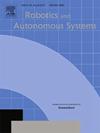利用反发音线性主动干扰抑制技术实现全向机器人的鲁棒轨迹跟踪
IF 4.3
2区 计算机科学
Q1 AUTOMATION & CONTROL SYSTEMS
引用次数: 0
摘要
本文提出了一种线性主动干扰抑制方案,用于全向机器人的鲁棒轨迹跟踪控制,在控制设计中加入了额外的饱和元素,通过在扩展状态观测器设计中加入饱和输入策略来改善瞬态闭环响应,缓解可能出现的峰值现象。此外,控制器是在机器人系统的运动学模型中实现的,假定位置和方向测量为可用信息,关于系统结构,只知道系统的阶次和控制增益矩阵。通过大量的实验室实验,包括与标准 ADRC(即不含提议的防抖动机制)和基于 PI 的控制(包括防抖动提议)的比较,在平滑和突变地形中存在不同干扰因素的情况下,对该提议进行了全面评估,验证了该提议在机器人稳健轨迹跟踪方面的实际优势。本文章由计算机程序翻译,如有差异,请以英文原文为准。
Robust trajectory tracking for omnidirectional robots by means of anti-peaking linear active disturbance rejection
This article presents a Linear Active Disturbance Rejection scheme for the robust trajectory tracking control of an Omnidirectional robot, including an additional saturation element in the control design to improve the transient closed-loop response by including a saturation-input strategy in the Extended State Observer design, mitigating the possible arising peaking phenomenon. In addition, the controller is implemented in the kinematic model of the robotic system, assuming as the available information the position and orientation measurement and concerning the system structure, it is just known the order of the system and the control gain matrix as well. A wide set of laboratory experiments, including a comparison with a standard ADRC (i.e. without the proposed anti-peaking mechanism) and a PI-based control including an anti-peaking proposal, in the presence of different disturbance elements in the terrain of smooth and abrupt nature is carried out to formulate a comprehensive assessment of the proposal which validate the practical advantages of the proposal in robust trajectory tracking of the kind of robots.
求助全文
通过发布文献求助,成功后即可免费获取论文全文。
去求助
来源期刊

Robotics and Autonomous Systems
工程技术-机器人学
CiteScore
9.00
自引率
7.00%
发文量
164
审稿时长
4.5 months
期刊介绍:
Robotics and Autonomous Systems will carry articles describing fundamental developments in the field of robotics, with special emphasis on autonomous systems. An important goal of this journal is to extend the state of the art in both symbolic and sensory based robot control and learning in the context of autonomous systems.
Robotics and Autonomous Systems will carry articles on the theoretical, computational and experimental aspects of autonomous systems, or modules of such systems.
 求助内容:
求助内容: 应助结果提醒方式:
应助结果提醒方式:


